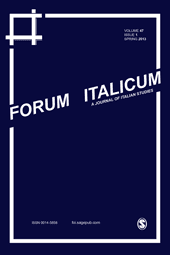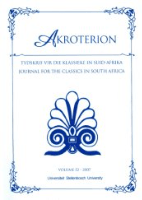
Rhythmica-Revista Espanola de Metrica Comparada
Scope & Guideline
Navigating the Landscape of Comparative Metrics
Introduction
Aims and Scopes
- Study of Metric and Rhythm:
The journal emphasizes the analysis of metric structures and rhythmic patterns in poetry, exploring how these elements contribute to poetic meaning and aesthetic experience. - Comparative Versification:
It encourages comparative studies of versification across different languages and cultures, highlighting the nuances in poetic forms and their evolution over time. - Historical and Aesthetic Perspectives:
Research often includes historical analyses of poetic forms and their aesthetic implications, examining how cultural and social contexts influence poetic expression. - Interdisciplinary Approaches:
The journal promotes interdisciplinary research that intersects with linguistics, musicology, and cultural studies, providing a broader understanding of metrics and rhythm in literary art. - Focus on Spanish Literature:
While it has a comparative approach, there is a strong emphasis on the metrics and poetic traditions of Spanish literature, reflecting the journal's roots and primary audience.
Trending and Emerging
- Intertextuality and Influence:
There is an increasing interest in the intertextual relationships between different poets and their works, examining how earlier texts influence contemporary poetic expressions. - Rhythm and Reality:
Recent themes focus on how rhythm serves as a medium for expressing reality in poetry, analyzing the relationship between metric structures and the portrayal of social and political contexts. - Innovative Poetic Forms:
The exploration of free verse and innovative poetic forms is gaining traction, reflecting a broader acceptance and analysis of non-traditional metrics in modern poetry. - Cultural and Historical Contexts:
A growing trend involves situating poetic analysis within broader cultural and historical frameworks, emphasizing how societal changes influence poetic forms and themes. - Digital Humanities and Metrics:
Emerging methodologies from digital humanities are being integrated into metric studies, providing new tools and perspectives for analyzing rhythm and meter in poetry.
Declining or Waning
- Traditional Forms of Poetry:
There seems to be a decreasing focus on traditional poetic forms, such as sonnets and ballads, as newer forms of expression gain traction in contemporary analysis. - Children’s Poetry and Nursery Rhymes:
The exploration of children's songs and nursery rhymes, while still present, is less frequent, possibly indicating a shift towards more adult and complex themes in poetic studies. - Linguistic Analysis of Proverbs:
The detailed linguistic analysis of proverbs and their metrics appears to be less prominent, suggesting a move away from purely linguistic studies toward broader cultural interpretations. - Historical Metrics:
Research dedicated to historical metrics, particularly from earlier centuries, has seen a decline, with a growing preference for contemporary analyses and modern poetic forms.
Similar Journals

Stilistica e Metrica Italiana
Connecting Scholars Through Innovative Literary DiscourseStilistica e Metrica Italiana (ISSN: 1591-6693), published by SISMEL EDIZIONI GALLUZZO, serves as a pivotal platform for scholars in the realms of Linguistics and Literary Theory. With an admirable Q1 ranking in Literature and Literary Theory and a Q3 ranking in Linguistics as of 2023, this Italian journal showcases the dynamic intersection of stylistic analysis and metric studies, providing critical insights into Italian literature and language from 2015 through 2023. Despite its open access restrictions, the journal's impactful contributions are underscored by its ongoing commitment to academic rigor, evident in its Scopus rankings placing it among the foundational texts in its field. Researchers, practitioners, and students will find this journal a valuable resource that fosters discourse and exploration within these literary and linguistic landscapes. Access to the latest research can be enjoyed by a diverse audience eager to engage deeply with contemporary issues in language and literature.

RLC-REVUE DE LITTERATURE COMPAREE
Illuminating Intercultural Narratives in LiteratureRLC-REVUE DE LITTERATURE COMPAREE, published by DIDIER-ERUDITION, is a prominent French journal focused on comparative literature and literary theory, holding an ISSN of 0035-1466. Established in 2001, the journal aims to foster scholarly exchange and critical analysis in the field of literature, examining texts across cultures and disciplines. With its current categorization in the Q4 quartile for literature and literary theory as of 2023 and holding a Scopus rank of #880 out of 1106, RLC remains an accessible resource for researchers, professionals, and students alike. While it operates under a traditional access model, it continuously strives to contribute to the academic discourse within its scope, enhancing the understanding of literary complexities and intercultural exchanges. Based in the heart of Paris, at 6 RUE DE LA SORBONNE, the journal invites contributions that explore innovative perspectives and methodologies in literary studies through its ongoing commitment to scholarly excellence.

POETICS TODAY
Unveiling New Perspectives in Literary StudiesPOETICS TODAY, a prestigious journal published by DUKE UNIVERSITY PRESS, stands at the forefront of scholarly discourse in the fields of literature and literary theory. With an ISSN of 0333-5372, this journal has garnered a significant impact within the academic community, achieving a remarkable Q1 category ranking in the 2023 literature and literary theory category, and proudly positioned in the top 94th percentile in Scopus rankings (Rank #63 out of 1106). Designed to foster innovative thought and critical analysis, it serves as a vital platform for researchers, professionals, and students alike, inviting contributions that challenge conventional paradigms and enhance literary scholarship. While POETICS TODAY does not offer open access, its rigorous peer-reviewed content is essential for any scholarly pursuit aimed at understanding the evolving dynamics of literature. Commencing from 2002 and converging through to 2024, this journal is committed to exploring the intersections of culture, theory, and literary practice, making it indispensable for anyone passionate about the literary arts.

BOLETIN DE LA REAL ACADEMIA ESPANOLA
Bridging Theory and Practice in Language StudiesBOLETIN DE LA REAL ACADEMIA ESPANOLA, published by the Real Academia Española, serves as a central conduit for scholarly discourse in the fields of Linguistics and Language. With an ISSN of 0210-4822 and an E-ISSN of 2445-0898, this esteemed journal has been disseminating impactful research since its inception in 2003. As a recognized Q2 journal in Linguistics and Language for 2023, it ranks in the 45th percentile in Arts and Humanities and 42nd percentile in Social Sciences according to Scopus metrics, reflecting its solid position in academic circles. Although not an open-access journal, it remains a crucial resource for those engaged in the vibrant study of language, providing insights that inform both theoretical frameworks and practical applications. Researchers, professionals, and students alike will find prominent studies and discussions that contribute to the evolution of linguistic scholarship. The journal is published in Madrid, Spain—an environment rich in linguistic heritage that further enhances its significance in the global academic community.

Ben Jonson Journal
Advancing Critical Dialogue on Jonson's ImpactBen Jonson Journal, published by Edinburgh University Press, is a distinguished academic periodical dedicated to the examination of the works and contributions of the esteemed playwright and poet, Ben Jonson. Since its inception in 1996, this journal has served as a vital platform for interdisciplinary research in the fields of literature and literary theory, fostering a deeper understanding of Jonson’s impact on the literary canon and cultural discourse. With an ISSN of 1079-3453 and an E-ISSN of 1755-165X, the journal occupies a notable position in the academic landscape, currently ranked in the Q4 category of the Scopus Arts and Humanities Literature and Literary Theory metrics and holding a percentile rank of 77th. Although it does not offer open access, the journal is committed to embracing rigorous scholarly standards and advancing critical dialogue among researchers, professionals, and students alike. Its geographical roots in the United Kingdom only amplify its relevance in the global literary community, making the Ben Jonson Journal an essential resource for those seeking to explore the complexities of early modern literature.

FORUM ITALICUM
Connecting Ideas: Where Language Meets LiteratureFORUM ITALICUM is a distinguished journal published by SAGE Publications Inc, focusing on the interdisciplinary fields of Cultural Studies, Linguistics, and Literary Theory. Established in 1967 and continuing its scholarly tradition into 2024, this journal aims to foster innovative dialogues and critical inquiries that intersect these dynamic disciplines. With an ISSN of 0014-5858 and an E-ISSN of 2168-989X, FORUM ITALICUM serves a global audience of researchers, professionals, and students. The journal holds a Q3 ranking in Cultural Studies and Literature and Literary Theory, illustrating its solid impact within these academic realms, while its presence in the Q4 tier within Linguistics and Language reflects its continued commitment to developing these areas of study. Despite its competitive rankings in Scopus, with percentages indicating varied fields in both the Arts and Humanities and Social Sciences, FORUM ITALICUM remains a vital platform for scholarly contributions that engage contemporary cultural phenomena and linguistic innovations. The journal advocates for Open Access publication to enhance the visibility and accessibility of its articles, making significant contributions readily available to the academic community. Located in Thousand Oaks, California, it continues to be an essential reference point for scholars seeking to explore the interplay between language, literature, and culture.

HUDSON REVIEW
Unveiling the Complexities of Human ExperienceHUDSON REVIEW is a prestigious literary journal published by HUDSON REVIEW INC, based in New York City. Established to foster an appreciation for the arts and literature, this journal provides a platform for in-depth literary analysis, critical essays, and poetry exploring the complexities of human experience. With its extensive history of publication and established reputation, HUDSON REVIEW plays a significant role in the literary field, attracting contributions from esteemed authors and scholars. While the journal operates under a traditional model without open access, it nevertheless offers valuable insights and promotes rigorous discourse among researchers, professionals, and students interested in the evolving landscape of literature and criticism. Noteworthy for its contributions from 2002 to 2011 in Scopus, the journal remains an essential resource for anyone looking to deepen their understanding of contemporary literary trends.

Anuario Calderoniano
Advancing Scholarship in Calderonian StudiesAnuario Calderoniano is a distinguished academic journal published by IBEROAMERICANA EDITORIAL VERVUERT S L, dedicated to the field of literature and literary theory. With an ISSN of 1888-8046 and a notable presence in the academic community, it is recognized for its insightful analyses and contributions to Calderonian studies. The journal has been systematically published from 2013 to 2015 and from 2017 to 2023, consistently examining the works of renowned playwright Pedro Calderón de la Barca and their relevance in contemporary literary discourse. As a Q3 journal in the Literature and Literary Theory category for 2023, it ranks in the 68th percentile among its peers, reflecting its importance and scholarly contribution to the field. While currently not offering open access, the journal remains a crucial resource for researchers, professionals, and students aiming to deepen their understanding of literary narratives and critical perspectives.

Akroterion-Journal for the Classics in South Africa
Bridging Past and Present: The Classics in a Modern ContextAkroterion: Journal for the Classics in South Africa is a premier open-access journal dedicated to advancing the study of classical antiquity within the context of South Africa and beyond. Founded in 1990 and published by SUNJOURNALS, this journal serves as a vital platform for the dissemination of scholarly articles, reviews, and critical perspectives that delve into the rich tapestry of classical literature, history, and culture. Based in Stellenbosch, South Africa, it provides international accessibility for researchers and scholars alike, enhancing the global discourse on classical studies. Despite its classification in the Q4 quartile of Classics and the 17th percentile of Scopus rankings, Akroterion remains committed to fostering innovative research and nurturing emerging voices in the field. By offering an open-access model, it ensures that valuable academic contributions reach a wider audience, empowering enthusiasts and professionals to explore the timeless relevance of classical studies today.

Journal of British and Irish Innovative Poetry
Unveiling the Dynamics of Poetic ExpressionJournal of British and Irish Innovative Poetry, published by the OPEN LIBRARY OF HUMANITIES, is an essential open-access platform that has been fostering scholarly discourse in the field of literature since its inception in 2015. Based in the United Kingdom, this journal offers a rich exploration of poetic innovation within the British and Irish literary landscapes, making significant contributions to the study of contemporary poetry. With an impressive Scopus rank of #433 out of 1106 in the Literature and Literary Theory category, placing it within the 60th percentile, this journal serves as a valuable resource for researchers, professionals, and students keen on examining the evolving dynamics of poetic expression. The journal operates under an open-access model, ensuring that its comprehensive range of articles, essays, and critiques are freely available to a global audience. By highlighting cutting-edge scholarship and diverse perspectives, Journal of British and Irish Innovative Poetry remains a pivotal outlet for advancing literary studies and fostering academic engagement in the vibrant world of innovative poetry.